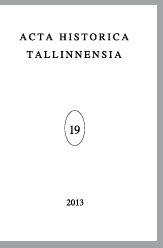AJALUGU, SÕDA, AJALOOSÕDA. ABHAASIA-GRUUSIA VASTUOLUD JA NENDE TÕLGENDUSED
HISTORY, WAR, WAR OF HISTORY. ON THE INTERPRETATIONS OF THE GEORGIAN–ABKHAZIAN CONFLICT
Author(s): Aivar JürgensonSubject(s): History
Published by: Teaduste Akadeemia Kirjastus
Summary/Abstract: This September marked the 20th anniversary of the end of the Georgian–Abkhazian war. The war started on 14 August 1992 with the Georgian aggression towards Abkhazia, who had declared its independence, and ended on 30 September 1993. In the war, 10 000–30 000 Georgian citizens and up to 3000 Abkhazian citizens lost their lives. As a result of the war, the majority of the Georgian community left Abkhazia, and this has remained the main source of conflict between Georgia and Abkhazia for the past twenty years. The perspectives from which this conflict has been treated and still is treated are different, stemming mainly from the two contradicting conceptions: the territorial unity of Georgia versus the right to self-determination of the Abkhaz people. In the present contribution, I discuss the different perspectives of the Georgian–Abkhazian conflict in public discussions. I illustrate how the history written by Abkhaz authors historicises ethnic special characteristics and how this activity is coined as a response to the aggressive ambitions of the Georgians. According to the Georgian authors, the ancient Abkhazian Kingdom was ethnically Georgian, according to the Abkhazian authors, Abkhazian. The Abkhazian historical writing emphasises the centuries-long continuity of the Abkhazian state, whereas the Georgian writings point out its interruptions. In the Abkhazian historical writings, Georgia is presented as a chauvinist assimilator and a coloniser, whose activity brought along the escalation of the conflict during perestroika, which culminated with a war in 1992–1993. The war itself is presented as a patriotic war for the Abkhaz people, due to which, first and foremost, the contribution of the Abkhaz people and also that of their kindred nations is pointed out, but not that of Russians. The Abkhazian historical writings that stress the link between the ancient and the contemporary Abkhazians, between the ancient and the contemporary state, are in compliance with the pattern of creating a nation: the national movements and interest groups strive for legitimising their attempts to gain independence by ethnic–cultural and settlement historical facts, if possible, also referring to any previous political independence.
Journal: Acta Historica Tallinnensia
- Issue Year: 2013
- Issue No: 19
- Page Range: 147-183
- Page Count: 37
- Language: Estonian

